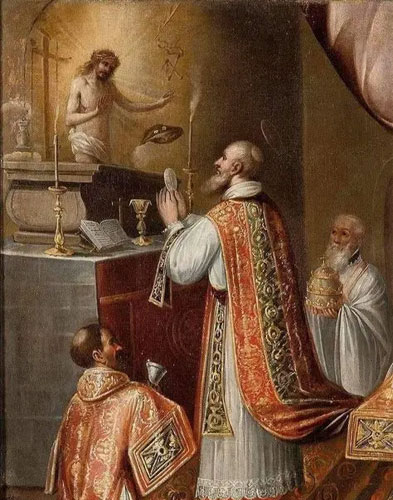There is an institution that appears in every era, wherever there have been men: it is the priesthood.
The priesthood comes to give priests who fulfill one of humanity’s most fundamental needs: the need for someone to be a mediator between God and men, especially by means of that classic task that we call sacrifice: Every high priest is taken from among men and made their representative before God, to offer gifts and sacrifices for sins (Heb 5:1). Dona et sacrificia pro peccatis, as the Vulgate says.
Priests make men’s aspirations and gifts rise to heaven, and they make God’s blessings come down from heaven.
There is a patriarchal priesthood, recorded in Sacred Scripture:
- The priesthood of Noah: Then Noah built an altar to the Lord, and choosing from every clean animal and every clean bird, he offered holocausts on the altar (Gn 8:20).
- The priesthood of Abraham, Isaac, and Jacob: As Abraham looked about, he spied a ram caught by its horns in the thicket. So he went and took the ram and offered it up as a holocaust in place of his son (Gn 22:13). So he [Isaac] built an altar there and invoked the Lord by name (Gn 26:25). He [Jacob] then offered a sacrifice on the mountain and invited his kinsmen to share in the meal (Gn 31:54).
- The priesthood of Melchizedek: Melchizedek, king of Salem, brought out bread and wine, being a priest of God Most High (Gn 14:18).
- The priesthood of Jethro, priest of Midian: Jethro, the father-in-law of Moses, brought a holocaust and other sacrifices to God (Ex 18:12).
- The priesthood of Job: Job, rising early, offered holocausts.[1]
Among the idolatrous people in Egypt, Babylon, Greece, and Rome, priestly power was confused with civil power. However, God saved the priestly institution and power by separating them from all secular power in those things that pertain to His service, and in this way He made the priesthood a true caste of chosen men; He did this in the priesthood of Aaron, a magnificent institution that has its origin in God and has God in its legislation.
Nevertheless, all of the grandeur of the Mosaic priesthood was only a figure of the future Priesthood. It was a figure of the High Priest. When Christ arrives and consummates His sacrifice, the ancient priesthood and sacrifices cease in order to give way to the One Eternal Priesthood and the One Eternal Sacrifice. Christ Himself is the Model of the Priest, and He is such in Himself and in His functions.
What is the priestly countenance of Jesus?
- Mediator
Christ needed to be a man: nothing more nor less, neither superior nor inferior to human nature: ex hominibus assumptus, that is, taken from among men (Heb 5:1). He must be a member of the society that He represents, in order to be an intermediary between that society and God.
God is not a priest, and cannot be because God is one of the extremes of the mediation: there is no mediator when only one party is involved, and God is one (Gal 3:20). Christ should not be of a superior or inferior nature, because the obligation of making offerings and expiations belongs to the rational creature who received life from God and who sinned against Him. Man should pay his own debts and he should offer the goods that he has received; he must expiate and adore.
The Word becomes man, He becomes incarnate, precisely in order to be a priest. The end of the Incarnation is Redemption, and this is carried out by Christ through the great priestly function of His Sacrifice.
Christ is at once both man and priest. His priesthood does not come to Him as something upstart and accidental, but rather by the very fact of being man. He is substantially man and substantially Priest. As a man He is the priest of men, because He did not take the nature of the angels; this is why He is not the priest of the angels, even though He is their Illuminator and their King.
He is truly the universal man, as He carried all of us in Himself. As He is the mediator of all, “He should bear the miseries and the sins of all”; “All were carried by Christ, who carried our sins.”[2]
This should inspire us to unlimited confidence.
On account of the hypostatic union, He is surely higher than the heavens (Heb 7:26). However, He not only humbled Himself to the point of living with us, but even to the point of making Himself miserable, loaded with the miseries of all. He intensified the pain of these miseries with a priestly love and mediation such that those sufferings make Him the universal representative of human sorrow and misery.
B. Called
No one is a priest on account of his own will nor by the will of civil authority; it is God who calls. Whoever takes the priestly investiture without being called or who exercises the functions of a mediator according to his whims is an intruder. Heb 5:4 declares:
No one takes this honor upon himself but only when called by God, just as Aaron was.
As a mediator between heaven and earth, the priest should be pleasing to both heaven and earth, but especially to heaven. The two functions that he carries out are adoration and expiation: as adorer he is the depositary of the love that men should offer to God, and as an expiator he reconciles men with God, removing the sins that lay between them.
Jesus Christ, Priest of the New Covenant, the One Priest in whom the entirety of the definitive and eternal priesthood will be incarnated, anticipated by the figure of the priesthood of the Mosaic Law, should be called by God, and with greater reason than Aaron.
The Word became flesh in order to redeem. He redeems by His Sacrifice; He sacrifices through His Being and His functions as Priest. Incarnation and Priesthood, Sacrifice and Redemption, are so intimately united in Jesus Christ that they are absolutely inseparable.
This calling is identified with His Divine Sonship and is the requirement of His divine commission.
This is why the author of the Letter to the Hebrews tells us: In the same way, it was not Christ who glorified himself in becoming high priest, but rather the one who said to him: ‘You are my son; this day I have begotten you’ (Heb 5:5).
He is called to be the Eternal Priest–without succeeding anyone and without successor–instituted in an extraordinary way: The Lord has sworn, and he will not repent: ‘You are a priest forever’ (Heb 7:21).
The etymological meaning of the Hebrew word for priest is man who stands. Thus, Christ is constantly praying to the Father, offering His Sacrifice, standing as the mediator of men before God. The secondary priest should do the same.
C. The Man Should Not Only Be Called, but Also Consecrated a Priest
The public investiture, that is, ordination, qualifies a priest to perform his sacred duties.
How was Jesus Christ ordained and consecrated a priest?
It was by the sheer fact of the hypostatic union of His human nature with the Person of the Word. The Word is the substantial Chrism, because He is substantially God.
Upon touching the humanity of Christ, He consecrated it as the One Priest, the Substantial and Total Priest, that is, as a Priest in His very nature and in His very being. Upon bringing humanity into contact with divinity, His humanity was intimately and totally invaded by it, and anointed by it in both soul and body.
Accordingly, in Luke 4:18 the Lord Himself says: The Spirit of the Lord is upon me, because he has anointed me to bring glad tidings to the poor. He has sent me to proclaim liberty to captives and recovery of sight to the blind, to let the oppressed go free. The Holy Spirit, spiritualis unctio, permeated Him, more so than oil on solid bodies, until it made Him a living and substantial anointing, not an anointed man, but rather “The Anointed,” Christ!
Furthermore, by His priestly consecration, Jesus is the Priestly Character by essence (as Saint Thomas says, “character aeternus est ipse Christus”[3]); He is the Priest by essence because of that consecration, constituted and consecrated as such in the Incarnation.
D. The Summit of Holiness
All of us are born stained. Even though we are priests, we commit many sins, and this is why during the presentation of the gifts we say, “With humble spirit and contrite heart may we be accepted by you, O Lord, and may our sacrifice in your sight this day be pleasing to you, Lord God.” This is repeated again during 146
the Penitential Rite, the washing of hands, and the “Lord, I am not worthy that you should enter under my roof.” Jesus Christ, on the contrary, does not have to say any of these things.
As man, Christ is the summit of created holiness; He is the essence of holiness. It was fitting that we should have such a high priest: holy, innocent, undefiled, separated from sinners, higher than the heavens (Heb 7:26).
- Holy: this had already been announced by the Angel Gabriel to the Virgin.
- Innocent: more so than Abel.
- Immaculate: with neither original nor personal sin.
Accordingly, He has no need, as did the high priests, to offer sacrifice day after day, first for his own sins and then for those of the people; he did that once for all when he offered himself (Heb 7:27).
E. Immortal
Christ will never die again. All other priests had to renew themselves without ceasing, but not Christ. He died once in order to consummate His Sacrifice, but He takes up His life again in order to offer His Sacrifice for all eternity. Saint Augustine says, “In His resurrection He made this evening sacrifice a morning sacrifice.”[4]
There are two types of priesthoods: one subject to the fatal law of death, and the other, by the power of a life that cannot be destroyed (Heb 7:16); accordingly, “He will not die again.” Christ is the Eternal Priest.
F. According to the Order of Melchizedek
Christ is of a unique category in the history of the priesthood. He is a new priest, one who interrupts and abrogates the Levitical priesthood. Like Melchizedek, He is both a King and a Priest. Like that king of Salem, Christ has no genealogy, because He has no father according to human generation, and no mother according to eternal generation. Christ is the King of Justice, just as Melchizedek was, because He is God; as a priest, Christ established justice between God and men when He paid what we owed in justice to the Father. Like that king of Salem, He offered bread and wine at the Last Supper; at that Supper, everything was new, as there was a new:
- Priesthood
- Sacrifice
- Covenant that He sealed in His own blood
- Reconciliation
- Redemption
These are no longer mere figures.
[1] Cfr. Job 1:5.
[2] Saint Cyprian, Epis. 63, 33: “Omnes portabat Christus, qui et peccata nostra portabat.”
[3] Saint Thomas Aquinas, S. Th., III, q. 63, a. 3.
[4] Saint Augustine, Commentary on Ps. 140, 4-6: CCL 40, 2028-2029.







